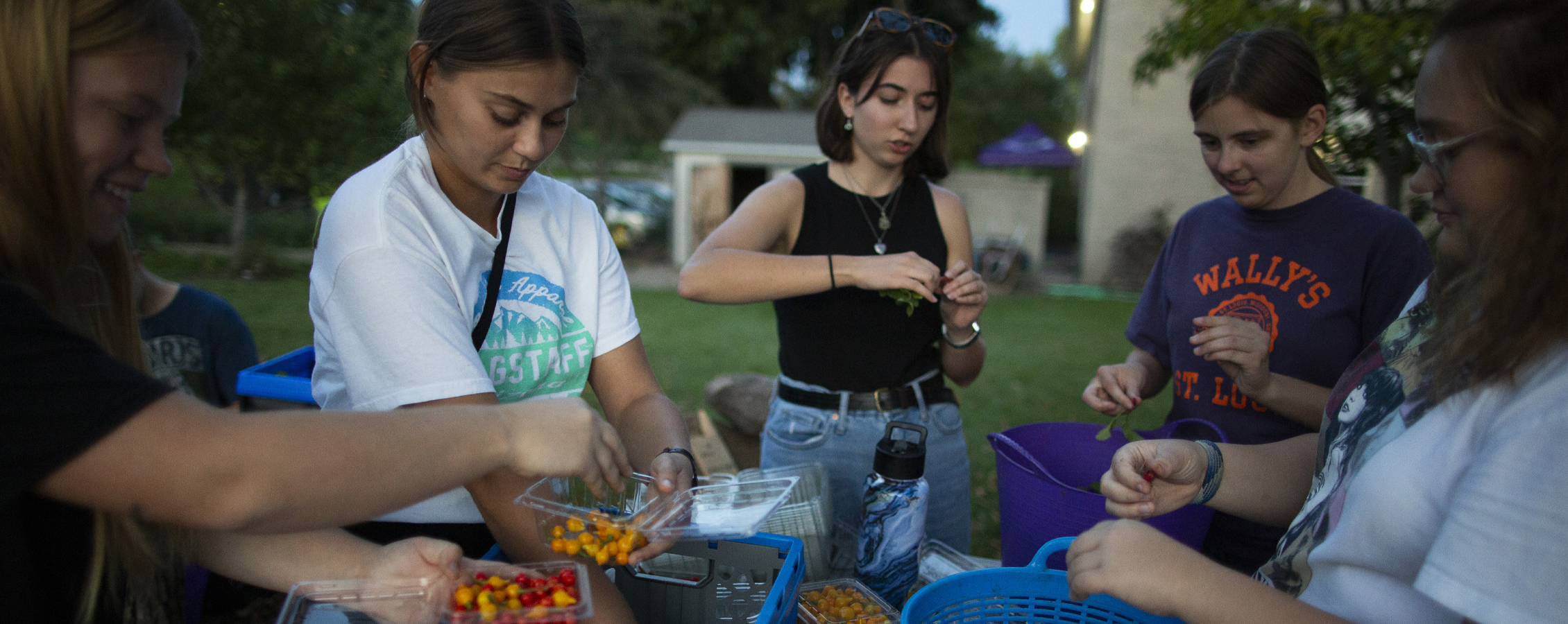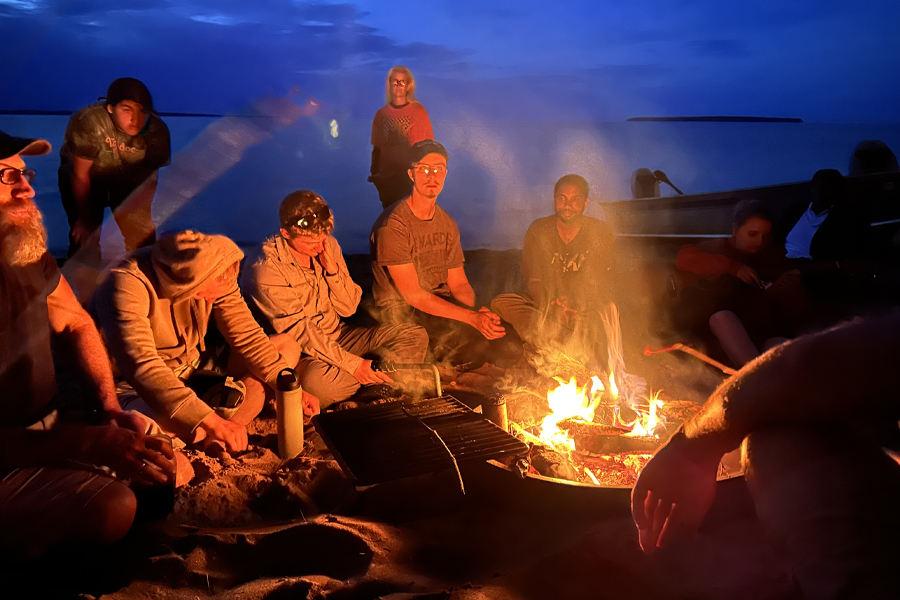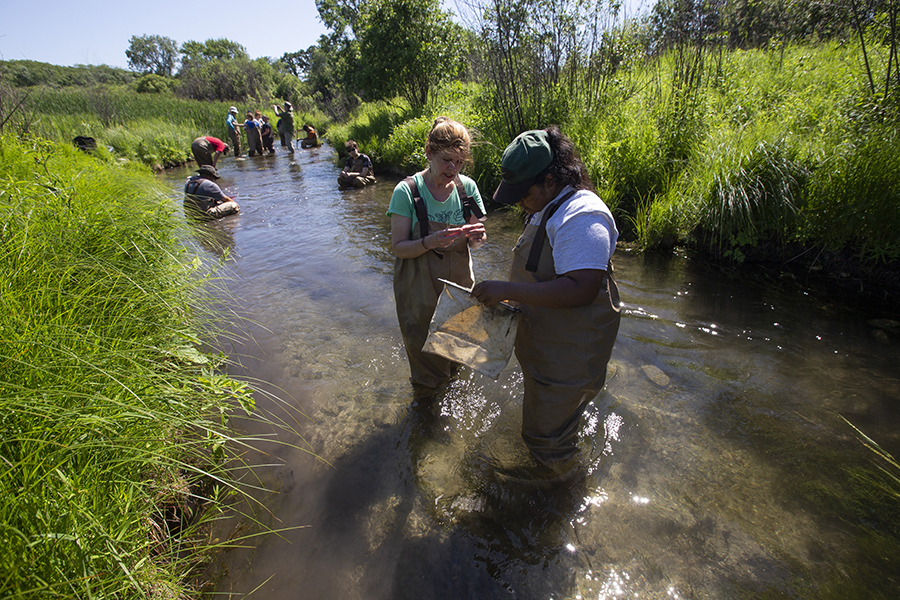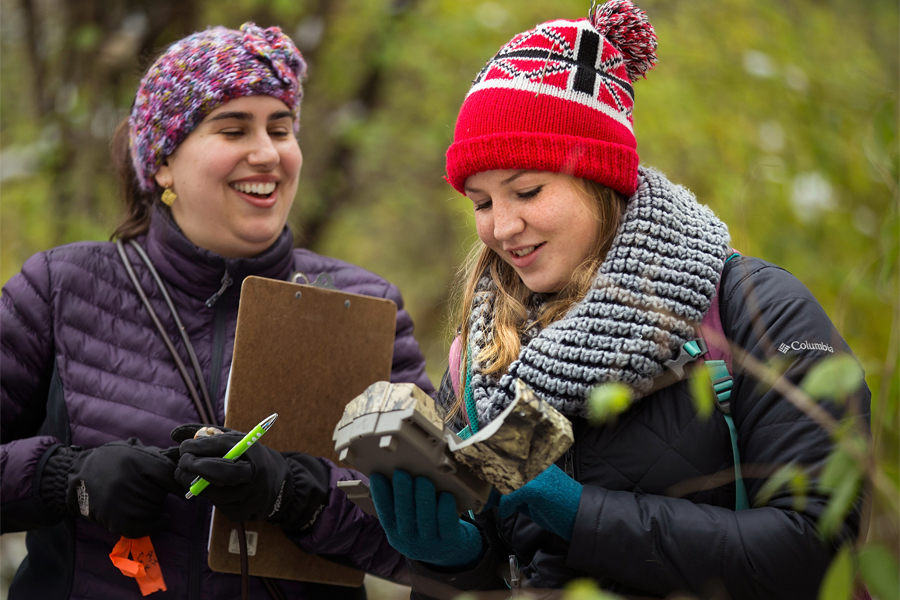UW-Whitewater’s Campus Garden earns Regents Diversity Award
February 06, 2024
Written by Chris Lindeke | Photos by Craig Schreiner and UW-Whitewater Dining Services
The University of Wisconsin-Whitewater’s Campus Garden, an initiative providing healthy food for a diverse population and educating students for more than 10 years, has been named a recipient of the 2024 Universities of Wisconsin Board of Regents Diversity Award.
The award recognizes individuals, departments, programs, units and/or teams for their exceptional efforts in fostering greater equity and diversity across their institutions and communities.
“This program has brought together students, staff, faculty and community members to support and serve individuals and families of the UW-Whitewater campus and surrounding community for a decade,” Provost John Chenoweth wrote in a letter of support for the garden.
“By incorporating sustainability methods into the program, it ensures that practices will not only promote healthy lives, but also nurture and protect the environment for generations to come.”
The Campus Garden, overseen by the university’s sustainability office, addresses food insecurity in the area to contribute to the well-being of underrepresented populations, first-generation students, and economically disadvantaged individuals. The program has donated more than 25,000 pounds of produce and has served an estimated 35,000 patrons in Whitewater and the surrounding areas.
The garden has also educated UW-Whitewater students — often those who come from a disadvantaged background or who grew up in urban areas where there is little to no produce grown — about environmental sustainability and lifelong gardening skills.
The Campus Garden team will be recognized on Feb. 9 at the Board of Regents meeting in Madison.
“We’ve had a lot of students come in of all races and backgrounds — they come in with almost no idea of where their food comes from,” said Wes Enterline, UW-Whitewater’s sustainability director. “There’s always a lot of trepidation and fear when they first get out to the garden — there’s a lot of bugs and other elements floating around.
“Once they start getting hands on and sampling some of the produce and some of the other herbs that we have out there, I think it kindles this curiosity. That’s where you see a light come on in their eyes, when they get out there and start learning a little bit more about it.”
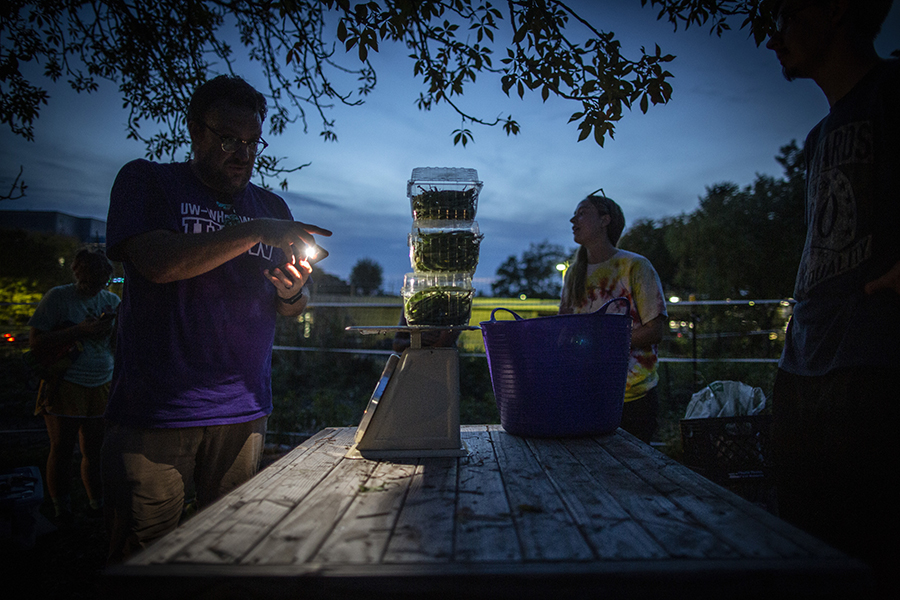
Produce from the garden is weighed by the cell phone flashlight of Wes Enterline, left, UW-Whitewater Sustainability director. The UW-Whitewater Garden Club turned out in force to help campus Sustainability interns harvest produce from the campus garden for delivery to both the campus and Whitewater food pantries on Tuesday, Oct. 3, 2023. (UW-Whitewater photo/Craig Schreiner)
Enterline founded the Campus Garden in 2013, five years after he was hired as sustainability coordinator at the university.
In 2008, after earning his second degree from UW-Whitewater — a B.S. in sociology with a minor in environmental studies and a certificate in Geographic Information Systems (GIS) — Enterline was hired for the job he proposed to Chancellor Richard Telfer and his executive staff as part of recommendations he made for a class presentation.

Pictured right: UW-Whitewater Sustainability Director Wes Enterline (UW-Whitewater photo/Craig Schreiner)
“It was the cultural ecology and sustainable development class that I took my last semester here with Eric Compas — that was the class where we did the greenhouse gas inventory and created recommendations, and one of those was to hire a sustainability coordinator,” Enterline said. “The job came out of that class work.”
Over his 15-plus years heading up the sustainability office, Enterline has created and developed a comprehensive campus sustainability program that addresses campus operational improvements, community engagement and academic integration.
Enterline paired the success of the Campus Garden with the Whitewater City Market to add to an operation already yielding hundreds of pounds of produce. Each Tuesday night during the market’s outdoor season, student interns bring the garden’s produce to the Whitewater Community Food Pantry, which serves a heavily Latino population of the city. While they’re downtown, where the city market is located, the students solicit additional donations from dozens of produce vendors and bring shopping carts loaded with fresh fruits and vegetables back to the pantry.
Over the years the Campus Garden collaborated with the city market, more than 12,000 pounds of fresh produce have been donated.
“One of the things we’ve been trying to do intentionally is have the students who grow the food go down and help at the food pantry during some of the open hours and share information about the produce,” Enterline said. “We’ll try to share recipes and other things. That gives them an opportunity to really feel that appreciation firsthand … the patrons or the clients of the food pantry can say thank you directly to them.”
Add the donations made to the Warhawk Pantry, which was founded in 2018, and the Campus Garden team provides fresh, healthy food for thousands of UW-Whitewater students and community members.
“The Campus Garden program and its hundreds of student workers and volunteers have learned to appreciate the power of leveraging the connections between seemingly disparate efforts,” said Kristine Zaballos, co-founder of the Whitewater City Market and the Warhawk Pantry and assistant director of University Marketing and Communications at UW-Whitewater. “They learned that the community depended on the fresh produce they provided, and showed up week after week knowing that they were making a difference.”
After taking on most of the leg work when the Campus Garden started, Enterline has built a staff of student interns that handles the day-to-day labor, including maintaining the garden and on-campus greenhouse. He tries to turn the positions over annually to provide the experience to as many students on campus as possible.
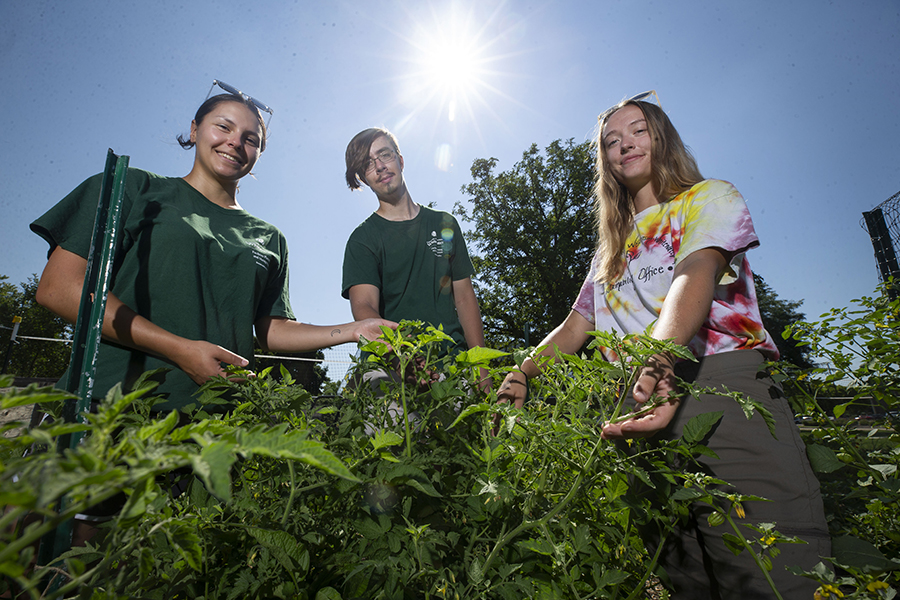
From left, Julia Schultz, an environmental science major from Franklin, Derek Wallis, an environmental science major from Sussex and Grace Morey, a biology major with an ecology emphasis from Sugar Grove, Illinois, work as summer interns with the UW-Whitewater Sustainability Program. They are shown in the Campus Garden on Thursday, July 27, 2023. (UW-Whitewater photo/Craig Schreiner)
Last summer, interns Grace Morey, Julia Schultz and Derek Wallis handled operations for the sustainability office. The group generated a program record 2,786 pounds of produce for donation.
Schultz, who will graduate this May with a degree in environmental science with emphasis in natural sciences, has been working in the sustainability office since the start of the spring 2023 semester. The Franklin native works primarily with the campus greenhouse, an area that becomes critical during the winter months, where she conducts volunteer sessions for students.
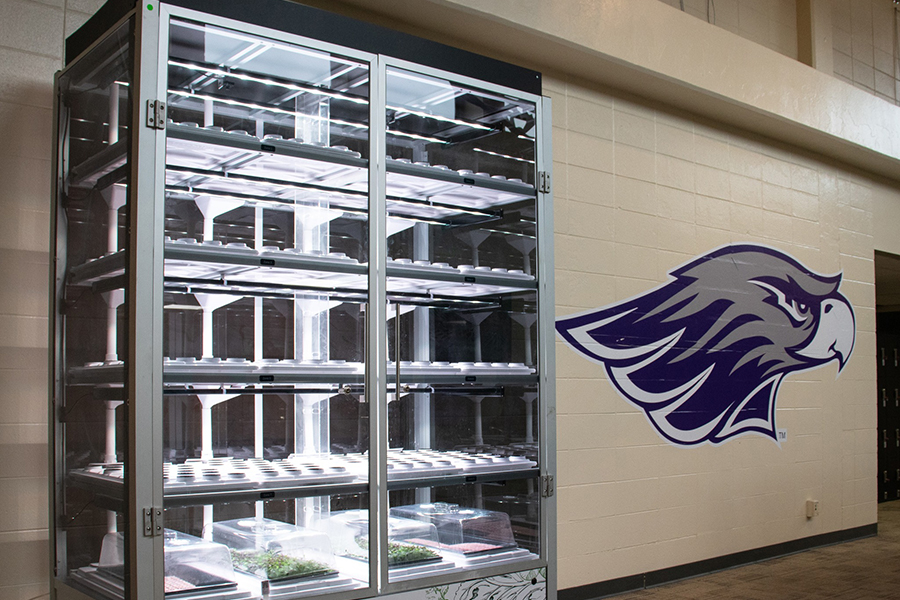
One of UW-Whitewater’s two Babylon Micro-Farms, which helps grow produce indoors in both Esker and Drumlin Dining Halls. (Photo courtesy of UW-Whitewater Dining Services)
Enterline paired Schultz with UW-Whitewater Dining Services to create a Babylon Micro-Farm, which generates produce that goes directly to the campus dining halls. The project helped her gain hard and soft skills that will benefit her in the future.
“He always wants people that want to gain skills through him, which I think is the coolest part,” Schultz said. “I feel like that’s what internships are all about — getting those skills for a future job. I’ve always wanted to do the plant side and hydroponics … he’ll take anything that you want to do and try and do it to the best that he can.”
Wallis earned his associate degree from UW-Waukesha before transferring to UW-Whitewater, citing the ability to work one-on-one with professors and instructors and the environmental science major as his reasons for choosing to become a Warhawk.
Starting out as a volunteer, Wallis was hired to the intern team last spring. He worked through the summer and fall and continues to assist in the sustainability office to see a couple of projects through to completion.
“It’s therapeutic — not just the garden work, but the nature preserve work,” said Wallis, a Sussex native who will graduate this May. “Taking a break from technology and all the stresses of our modern world and doing something with your hands is very relaxing. I encourage a lot of my friends, especially around finals weeks, to come out and take a break from coursework, technology and everything, and just have some time to unwind.”
By earning the Universities of Wisconsin’s Board of Regents Diversity Award, UW-Whitewater’s sustainability office will receive a $7,500 award.

